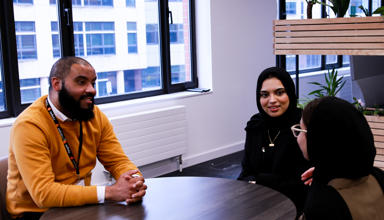“When somebody doesn't look ill, it's easy to make the assumption that they're lazy or mean or not thinking of others. But when I go to the accessible toilets it's because I have my ostomy bag and I do need a bit more space and running water."
Sam Cleasby, Disability Campaigner
What is meant by invisible disability?
The majority of impairments are not visible. Out of the millions of disabled people living in the UK, only a small percentage have illnesses that can actually be seen. These people are living with an invisible disability.
Invisible disabilities refers to a wide range of conditions and illnesses that are not immediately apparent or visible, and therefore obvious. They include: cognitive dysfunctions; brain injuries; learning difficulties; epilepsy; cancer; diabetes, sickle cell, fibromyalgia; HIV; Aids; gastrointestinal problems; myalgic encephalopathy or myalgic encephalomyelitis (ME); mental health conditions, as well as hearing and visual impairments, to name a few.
It is worth noting that someone who has a visible impairment or uses an assistive device such as a wheelchair, walker or cane can also have invisible disabilities, for example a person in a wheelchair may also have a mental health condition.
What are the challenges of living with an invisible disability?
Like any disabled person, a person living with an invisible disability faces stigma, exclusion and discrimination and the constant task of challenging misconceptions about their conditions.
However, people with invisible disabilities may not always experience discrimination in the same way as someone with a noticeable disability. They can also face obstacles such as being accused of misusing accessible toilets, disabled parking spaces, and other facilities.
A person with an invisible disability has a right not to explain their illness to a stranger. For many people with invisible disabilities, using accessible toilets or disabled parking spaces is not a luxury or privilege. It’s a necessity in order for them to lead their lives.
Those who judge are undoubtedly not doing it out of malice, rather they genuinely believe that they're defending the rights of people who are in need. But even if that assumption comes from a place of kindness it is best not to make assumptions. You might think you're doing the right thing, but you could be making it worse for somebody already struggling.
Invisible Disabilities and the Welsh Parliament (Senedd) [1]
As an employer we recognise that the number of people in the UK, who reported a disability in 2019 to 2020 was 14.1 million[2]. This means that nationally, 22% of people have a disability. We understand that encouraging applications from disabled people is good for business. It can help us to:
- Increase the number of high quality applicants available.
- Create a workforce that reflects the diverse range of customers we serve and the community in which we are based, and
- Bring additional skills to the organisation. The costs of making reasonable adjustments to accommodate disabled employees are often low. The benefits of retaining an experienced, skilled employee who has acquired an impairment are usually greater than recruiting and training new staff. It is also good for the individual.
That is why the Senedd Commission is committed to promoting equality of opportunity for Commission staff, Members of the Senedd, their staff and the people of Wales. We strive to be an inclusive organisation that values everyone that works here, their diverse perspectives, skillsets and range of backgrounds. To that end we are proud to have:
- A range of facilities on site to ensure that we are an accessible organisation: including a range of different toilet facilities such as gender neutral toilets, accessible toilets, a changing places facility with adult hoist, and toilets for people with mobility issues. To find out more about our accessible facilities, visit Euan’s Guide, the disabled access review website.
- Great policies, such as hybrid working, flexible working, including career break, part-time working, job share, term time working, condensed hours working and special leave.

- Demonstrated to people that we are positive about employing and retaining disabled people. We are a Disability Confident employer and have committed to guaranteeing an interview to people with disabilities if they meet the essential requirements for the position.
- A disability network for staff at the Senedd that provides informal peer support, and advice on diversity, inclusion and equality. The network also advocates for enhancing career development and progression opportunities and advises on how new policies could affect staff with disabilities to make sure everyone is treated fairly.

- Health, Safety and Wellbeing and Occupational Health teams, which offer a wide range of services to assist employees in managing their health and well-being. This includes assisting staff returning to work after periods of absence and counselling and support services through the Employee Assistance Programme.
[1] The Welsh Parliament is the democratically elected body that represents the interests of Wales and its people. Commonly known as the Senedd, it makes laws for Wales, agrees Welsh taxes and holds the Welsh Government to account.
[2] SCOPE and the Family Resources Survey 2019 to 2020.




